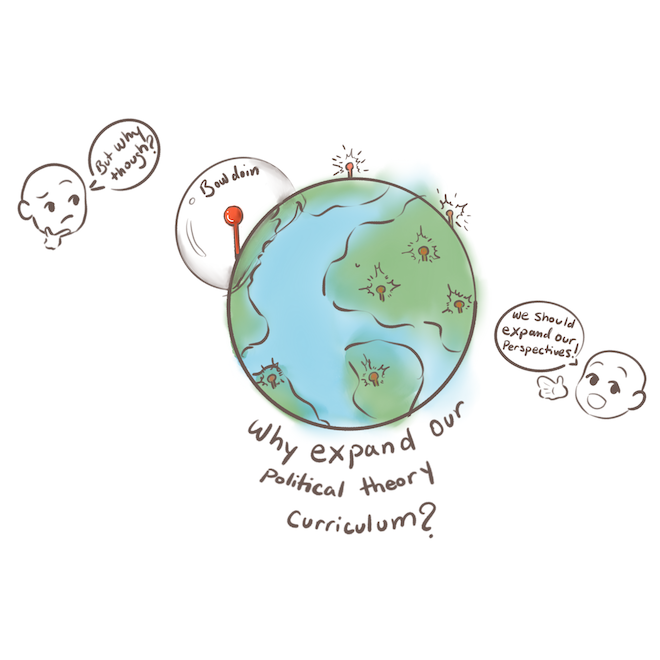Diversity and political theory, revisited
September 29, 2023
 This
piece represents the opinion of the author
.
This
piece represents the opinion of the author
.
 Si Ting Chen
Si Ting ChenA few Mondays ago, during a class discussion, a fellow student made mention of an Orient op-ed that immediately aroused my interest. The piece,“It’s past time to pluralize political theory at Bowdoin,”purportedly criticizes Bowdoin’s political theory courses for focusing solely on Western thinkers. Upon reading the article myself, I felt I should write a response.
I should begin by clarifying that I do not mean to impugn the motives of the aforementioned article’s author, Leif Maynard. A former theory student himself, Maynard makes it clear that he writes from a place of care and concern. I additionally do not intend to reject Maynard’s primary conclusion. As a current theory student and someone who likewise cares deeply for the project Bowdoin’s theory courses collectively represent, I would simply like to challenge the reasoning Maynard offers in support of his conclusion. I agree that theory courses should expand to include thinkers outside of the West. I disagree that this should occur for the purpose of correcting limitations in perspective.
Bowdoin political theory courses are, in truth, not political theory courses at all. Their overriding appeal lies in their tendency toward political philosophy. To borrow from Leo Strauss, political theory consists of “comprehensive reflections” that appeal “in the last resort to … public opinion.” Political philosophy, on the other hand, attempts boldly to replace by reason opinions regarding the fundamental questions with knowledge of the whole. It does not settle for the simple study of thought, ideas or legal structures but strives for knowledge of ends.
Professor Yarbrough has long been insistent that her students not reduce thinkers to being products of their times, challenging students to disagree with the arguments these thinkers make rather than imputing differences in thought to mere matters of opinion. It is this challenge that so captivates theory concentrators—the task of arguing intelligibly about what our politics ought to look like, the hope that we need not be the helpless puppets of history and culture. And it is in service of this hope that I now write.
In his op-ed, Maynard criticizes theory courses for approaching politics from a purely “Western perspective.” He argues that teaching only the ideas of “white … European or North American authors” robs conversations of “valuable perspectives.” Here I must disagree. I do not doubt that great political philosophers have existed outside of the West. I additionally do not doubt that the current focus our canon has on the West is likely a product of historical prejudices.
But I do not believe the loss incurred here is one of perspective. The whole hope of political philosophy is that human beings can strive toward knowledge of proper ends and that all positions in this domain are not by default opinions dispensed by history and culture. To say that even great minds are somehow constrained in what they can contribute by virtue of their position and heritage is to reject outright the possibility of political philosophy. As soon as our theory professors begin searching for “diverse perspectives” by scanning a map, the political theory concentration will become but history by another subject. Our work will change radically from seeking eternal truths to learning the many thoughts that have happened by happenstance. One might object that all political ideas are indeed the result of happenstance—dispensations of history, assertions of will. I do not seek to prove otherwise here. I merely point out that accepting such a position unavoidably saps political theory courses of all philosophical life.
This asterisk being added to the conversation, let me conclude by adding one more. If we are to earnestly pursue knowledge in fundamental things, we can never be satisfied with the great minds history has uncovered for us. We cannot suffer that those minds yet undiscovered remain unknown merely because prejudices prevented their prominence in the past. But in seeking what tradition has not given us, there is a danger we should be keenly aware of. As Strauss warns, we too readily conclude that our own notions, by virtue of coming later, are innately superior. Liberal education, education in culture, grants us the gift of humility, compelling us to engage with contributions we might otherwise deem archaic. We should be careful that, in extending our canon, we do not simply add those authors we find most compatible with our current suppositions. Such would deprive us of the sort of diversity in thought contributed by those “white … European or North American authors,” who seldom agree with us.
Danny Haskell is a member of the Class of 2024.

Comments
Before submitting a comment, please review our comment policy. Some key points from the policy: